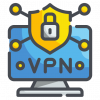It is evident that times have changed. After the health and financial crisis caused by the outbreak of Covid-19, we have had to adapt and modify our habits both personally and at work. A large part of the world's population has begun to work from home and many companies have been forced to adopt teleworking even without being properly prepared.
We are aware that browsing the Internet is not always safe and that on many occasions we share more information than we should.
Some companies are aware of these dangers and have virtual private networks (VPNs).
A VPN allows the computer to send or receive data with all the functionality, management and security policies of a private network.
This is done by establishing a point-to-point connection using dedicated, encrypted connections or a combination of both.
Every time you connect to the Internet you fill out a “form” with a series of key data:
- What is my ip?
- Where do I connect from?
- Do I use a private or public network?
Connecting to the Internet through a VPN will allow you to encrypt your data.
A VPN is a layer of protection that acts on two fronts.
On the one hand, it creates a virtual tunnel that encrypts all our Internet data, so that no one can spy on it.
And on the other hand, it hides our IP address (which reveals who we are and where we are) by making all our traffic go through the VPN servers first.
So are VPNs safe and reliable?
When they are active, yes.
The problem is that we are talking about software that takes control of your connection and that software can fail, or be blocked by a failure of another program or a virus that you have in memory, and leave your connection exposed. Even if they are only a few seconds, they are enough for a supposed spy to discover who you are, or what you are doing.
There is also what is known as a DNS leak, where a VPN slowdown causes the operating system to switch to standard, unencrypted DNS servers, exposing your connection.
DNS stands for Domain Name System and is a technology based on a database that is used to resolve names on networks, that is, to know the IP address of the machine where the domain is hosted. which we want to access.
As we have mentioned, sometimes while you are using a VPN a DNS leak can occur.
Because the virtual private network, due to saturation or other failure, takes time to respond to an access request, Windows (or the operating system you are using) changes the VPN's DNS servers to the unprotected DNS that we normally use, leaving revealed our connection.
It's a rare bug, but it happens. That is why it is important for a company to have specialized profiles in cybersecurity, in addition to the fundamental technological profiles.
Advice: If you use a VPN and want to know if your connection suffers from DNS leaks, you can perform a check using some reliable websites that allow you to perform this check by passing a test such as, for example, DNS Leak.
Author: María José Peña. Computer engineer. IT Project Director. Passionate about Cybersecurity



































